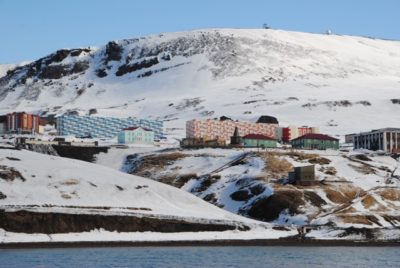UPDATED: Russian Foreign Minister Sergei Lavrov has asked for “bilateral consultations” with his Norwegian counterpart, Ine Eriksen Søreide, to discuss what Russia sees as limitations on its activities on Svalbard, the Arctic archipelago that’s subject to an international treaty but administered by Norway. It’s the latest sign of tension between Russia and Norway, which also has denied entry visas for a Russian military dance group.

The request for the consultations comes in a message sent to Eriksen Tuesday in connection with this year’s 100th anniversary of the Svalbard Treaty. Russia describes the treaty as “a vital multilateral document” that formalized the “unique legal status” of the archipelago. Russia acknowledged that it “recognized Norway’s sovereignty over Svalbard,” but also “guaranteed the rights and legitimate interests of the other parties” to the treaty, including Russia.
Now Russia is calling on Norway to comply “with the letter and spirit of the 1920 treaty” regarding “equal liberty of access and entry” to Svalbard and treaty partners’ ability to conduct commercial and economic operations there “on a footing of absolute equality.” Russian officials are “concerned,” according to their “message” to Eriksen, about “restrictions imposed on the use of Russia’s helicopter on Svalbard, a deportation procedure adopted exclusively for Russian citizens on Svalbard, the unlawfulness of Norway’s fisheries protection zone, the unreasonable extension of nature protection zones where economic operations are limited” and “several other problems.”
Russia has long had a settlement at Barentsburg, a few hours’ boat trip from Svalbard’s main town of Longyearbyen. Russia has invested heavily in Barentsburg in recent years, building new housing for workers at its mine there and conducting tourism operations.

“We do not intend to curtail our presence there,” stated Russian authorities in their message to Søreide. “On the contrary,we have long-term plans for strengthening, diversifying and modernizing it.”
The Russian ministry claimed it wants to develop “lasting and constructive cooperation with Norway on Svalbard” and promote “a dialogue on practical matters.”
Audun Halvorsen, a state secretary in Norway’s foreign ministry, confirmed receipt of the message and told Norwegian Broadcasting (NRK) Tuesday evening that the Russian “viewpoints” are regularly brought up by the Russians and “well known to Norwegian authorities.”
All operations on Svalbard, however, must be carried out “within the framework of Norwegian laws and regulations,” Halvorsen said. Norway believes it’s necessary to maintain “strict regulation of business activity, such as helicopter flights on Svalbard,” out of consideration for the area’s sensitive Arctic nature.
NRK noted, however, that Norway’s fishing zone around Svalbard is internationally contested. Most countries have nonetheless accepted Norwegian regulation of fishing in the area. Halvorsen said Norway was “evaluating” a response to the Russians’ letter.
Cultural ensemble denied entry
Norway was standing firm, however, on its denial of entry visas to a military choral and dance ensemble tied to the Russian northern fleet. Norwegian organizers of the annual Barents Spektakel festival in Kirkenes had invited the ensemble to perform at the city’s major winter event next week.
Their entry visas have been held up by both Russian and Norwegian authorities. NRK reported that Russian defense officials won’t allow the fingerprinting of ensemble members required by applications for the necessary “Schengen” visa that also would allow travel within all EU and EEA countries. The Norwegian authorities can waive the fingerprinting rule but don’t deem participation at the festival important enough to do so.
The rule was waived when the same ensemble performed in Kirkenes just last fall at ceremonies marking the 75th anniversary of the liberation of Finnmark by Soviet Russian troops at the time. Russia’s embassy in Oslo has complained that the Norwegians’ refusal to waive the fingerprinting rule “isn’t only negative for the cultural ties between our two countries, but also creates hindrances to the good neighbourly relations that help build confidence between Russia and Norway.” The Norwegian organizers in Kirkenes were disappointed as well.
newsinenglish.no/Nina Berglund

